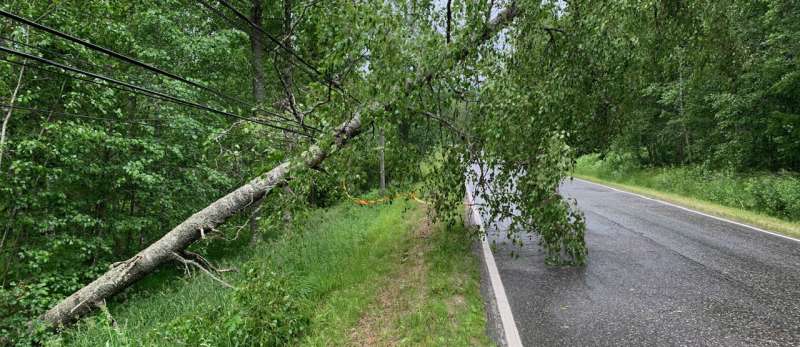Machine learning helps to predict blackouts caused by storms

Doctoral candidate Roope Tervo will defend his doctoral dissertation on computer science at Aalto University on 2 November 2021. The thesis studies using machine learning on weather impact predictions focusing on the power outage and train delay predictions. The work has been done in collaboration with Finnish Meteorological Institute (FMI) and Prof. Alex Jung’s big data research group at Aalto University.
The disasters influenced altogether over 4 billion people and required 1.23 million lives between 2000 and 2019. In Finland, adverse weather such as thunderstorms, windstorms, and long-lasting snow precipitation cause many kinds of disruptions including power outages and train delays. Meteorological services have a long and honorable tradition to predict the upcoming extreme weather. However, in the middle of the challenging tasks of their own, power grid and rail traffic operators want more specific predictions about impacts to their domain.
“Machine learning—methods finding patterns in existing data and thus being able to make predictions for new data—is ideal for predicting weather-inflicted impacts,” Tervo says.
The thesis studies several advanced machine learning methods, such as random forests, neural networks, and Gaussian processes in two applications.
The first application identifies, tracks, and classifies storm objects using weather radar data and ground observations. The method classifies the storm cells based on their damage potential to the power grid. It predicts a storm cell movement a few hours ahead providing important advancement for the power grid operators. Tervo has also extended the method to large-scale storms and days-ahead time range by modifying it to work with much coarser numerical weather prediction (NWP) data.
Promising results
In addition, the thesis studies the task of predicting weather-inflicted train delays days ahead by conflating weather parameters on train delay data. Such predictions offer cardinal information for rail traffic operators in preparing the challenging conditions.
Results are promising: “the object-oriented approach is a vindicable method to predict power outages caused by convective storms and a similar approach is feasible also with large-scale storms,” Tervo says. The thesis also demonstrates that the train delays related to adverse weather can be predicted with good quality training data.
The results should be relatively general.
“Presumably, similar approaches can be applied to any other domain with quantitative impacts produced by identifiable weather events, if sufficient impact data are available,” Tervo concludes.
AI predicts if storms will cause blackouts many days in advance
Citation:
Machine learning helps to predict blackouts caused by storms (2021, October 28)
retrieved 28 October 2021
from https://techxplore.com/news/2021-10-machine-blackouts-storms.html
This document is subject to copyright. Apart from any fair dealing for the purpose of private study or research, no
part may be reproduced without the written permission. The content is provided for information purposes only.
For all the latest Technology News Click Here
For the latest news and updates, follow us on Google News.
